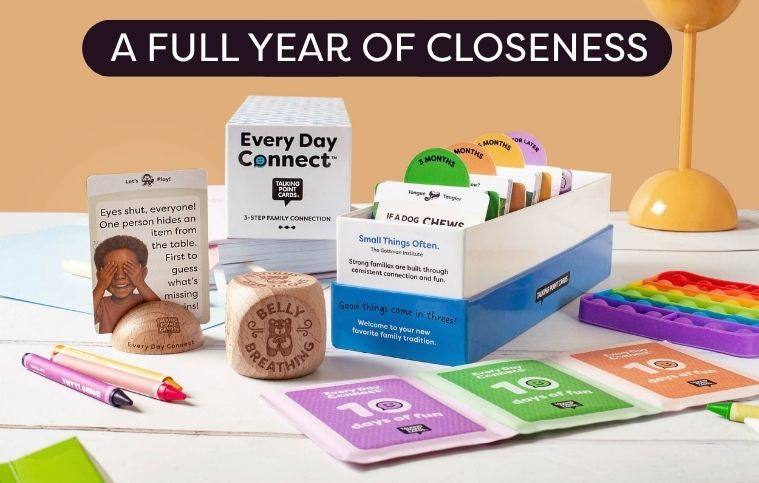SHOP
About
RUOK Day
How a Conversation Can Change a Life

Imagine a world where we all took the time to check in on those around us, to truly listen and be present in the lives of our friends, family, and colleagues. That's the powerful vision behind RUOK Day, an Australian initiative that has captured the hearts and minds of people across the globe.
In a society that often prioritizes productivity and surface-level interactions, RUOK Day stands as a reminder that the most meaningful change can come from the simplest of actions - a genuine conversation. As the creators of this movement say, "Our mission is to inspire people to meaningfully connect with those around them and start a conversation with anyone who may be struggling with life."
The Power of Conversation
At the heart of RUOK Day is the belief that a conversation can be the difference between someone feeling isolated and alone, and someone feeling heard, understood, and supported. When we take the time to ask, "Are you okay?" and truly listen to the response, we open the door to deeper connections and the possibility of transformative change.
"A conversation can change a life." - RUOK.org.au
But why is conversation so powerful? The answer lies in our fundamental human need for connection. We are social creatures, wired to crave belonging and meaningful interactions. When we feel isolated or disconnected, it can have a profound impact on our mental health and overall well-being.

"The most important thing in communication is to hear what isn't being said."
- Peter Drucker
The Importance of Listening
One of the key tenets of RUOK Day is the art of listening. It's not enough to simply ask the question; we must also be prepared to listen with empathy, without judgment, and with a genuine desire to understand. Listening allows us to connect on a deeper level, to validate the other person's experiences, and to offer genuine support.
Breaking the Silence
For many people, opening up about their struggles can be incredibly difficult. There may be a fear of being a burden, of being judged, or of not knowing how to articulate their feelings. RUOK Day encourages us to create a safe space where people feel comfortable sharing their experiences, free from the fear of stigma or dismissal.
By initiating these conversations, we can help break the silence and remove the stigma surrounding mental health. We can let others know that it's okay not to be okay, and that they have a supportive network ready to listen and offer guidance.
"Suicide is preventable, and the more people we can get talking, the more lives we can save."
- Gavin Larkin, Founder of RUOK Day

The Origins of RUOK Day
RUOK Day was founded in 2009 by Australian ad executive, Gavin Larkin, who lost his father to suicide. Inspired by his father's story and the power of human connection, Larkin set out to create a national day of action, dedicated to encouraging people to check in on their loved ones and start meaningful conversations.
The first RUOK Day was held in 2009, and since then, the movement has grown exponentially, with people around the world embracing the message and incorporating it into their daily lives. Today, RUOK Day is celebrated annually on the second Thursday of September, with events, campaigns, and grassroots initiatives taking place in communities across the globe.
Putting RUOK Day into Practice
Participating in RUOK Day is simple, yet profoundly impactful. It's about taking the time to reach out to someone you care about and asking them, genuinely, "Are you okay?" But as with any meaningful interaction, there's a bit more to it than just that.
Preparing for the Conversation
Before initiating a conversation, it's important to do a bit of self-reflection. Consider your own mental state and emotional capacity to provide support. If you're not in a good place yourself, it may be better to reach out to someone else who can offer more constructive help.
Next, think about the person you want to connect with. What do you know about their current situation? Are there any specific challenges or stressors they've been facing? Having this context can help you approach the conversation with empathy and understanding.
Starting the Conversation
When the time comes to have the conversation, be mindful of your tone and body language. Maintain eye contact, speak gently, and make it clear that you have time to listen without distractions. Start with open-ended questions that encourage the other person to share, such as:
-
"I've noticed you've seemed a bit down lately. How are you feeling?"
-
"I wanted to check in and see how you've been doing. Is there anything you'd like to talk about?"
-
"You mentioned you've been going through a tough time. I'm here to listen if you need someone to talk to."
Active Listening
As the conversation unfolds, resist the urge to offer advice or jump in with your own experiences. Instead, focus on actively listening, asking follow-up questions, and validating the other person's feelings. Phrases like "I see," "That sounds really difficult," and "I'm here for you" can go a long way in making the person feel heard and understood.
Offering Support
If the person you're talking to expresses that they're struggling, be prepared to offer practical support. This could mean helping them identify resources, such as mental health professionals or support groups, or simply offering to check in on them regularly. The key is to avoid making assumptions and to let the person guide you on how best to help.
Checking In
Remember, RUOK Day is not just a single event, but an ongoing commitment to maintaining meaningful connections. After your initial conversation, be sure to follow up and check in on the person's wellbeing. This shows that you truly care and that you're invested in their journey.
The Impact of RUOK Day
The impact of RUOK Day is profound and far-reaching. By encouraging people to start conversations and connect on a deeper level, the initiative has the power to transform lives and communities.
Reducing Stigma
One of the primary goals of RUOK Day is to reduce the stigma surrounding mental health. By normalizing open and honest conversations, the initiative helps to break down the barriers that often prevent people from seeking the support they need.
Fostering Connections
When we take the time to check in on our loved ones, we're not only providing them with a listening ear, but we're also strengthening the bonds of our relationships. These connections can be a lifeline for those struggling with mental health challenges, offering a sense of belonging and community.
Saving Lives
Ultimately, the most important impact of RUOK Day is its potential to save lives. By encouraging people to have open and honest conversations about their mental health, the initiative creates opportunities for intervention and support that can make all the difference.

"The greatest gift you can give someone is your time, because when you give your time, you are giving a portion of your life that you'll never get back."
- Rick Warren
RUOK Day is more than just a single day of action; it's a movement that challenges us to reexamine the way we connect with one another. By embracing the power of conversation and making a conscious effort to check in on those around us, we can create a world where no one feels alone, where mental health is destigmatized, and where the simple act of asking "Are you okay?" can truly change a life.
So, the next time you see someone who seems a bit off, or you notice a friend or family member going through a difficult time, remember the lessons of RUOK Day. Reach out, start a conversation, and be the listening ear that could make all the difference. Because when we get talking, we have the power to transform not just individual lives, but the very fabric of our communities.
LIKED THIS ARTICLE?
SIGN UP FOR MORE!







